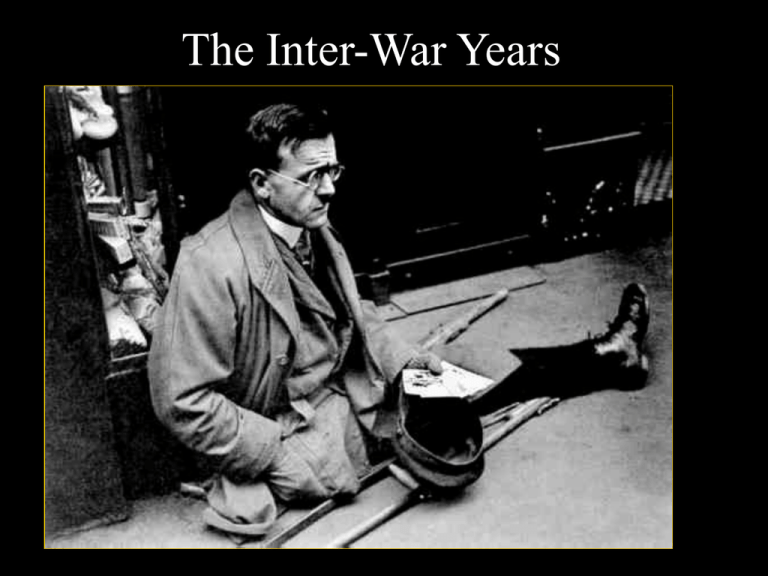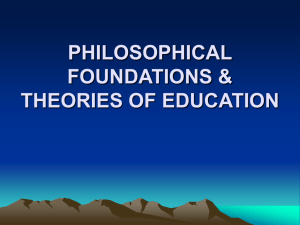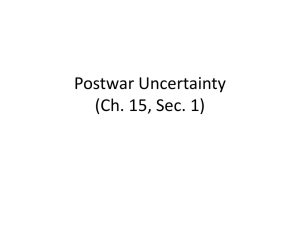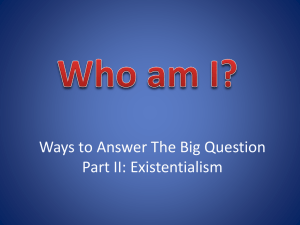
The Inter-War Years
Major Themes of This Lecture
I.
The Age of Anxiety The Loss of
Confidence in Continuous Human
Progress and the Power of Human
Reason
II. The Search for Post War Stability in the
1920s
III. The Destruction of That Stability- The
Great Depression
Attempt At Another Amazing Metaphor
Pre 1914 World
Society/ The Age
of Anxiety
Shorter
Work
Hours
Technological
Gadgets to
Ease Life
World War I
Reason
Science
Freud
Stream of
Consciousnessdistopias
Progress
Peace
Einstein
Industry
Existentialism
Theme #1 The Age of Anxiety
What was it?
–A break in the centuriesold faith in human progress
that had started in the
Renaissance and continued
through the Scientific
Revolution , Enlightenment,
and Industrial Revolution
–“Perhaps human reason
can solve all of our
problems…”
–“Umm… ok… scratch
that.”
Why this loss of faith?
Largely because of the horrors of WWI
– ‘This is what science and reason brought us?’
Evident across many fields: philosophy, psychology,
literature, physics
Pre World War I = optimism for the future
Post World War I= pessimism for the future
“If modern science brought us the slaughter in the
trenches, what will future ‘progress’ bring us?
– Not totally misguided… think about the atom
bomb
Nietzsche
Philosophy
– Reason and human intellect are weak
– Instead, emotion and passion are the keys to human
strength
– Human society glorifies the weak (‘blessed are the
meek’), but should instead glorify the strong
– God is dead
– There is no external meaning… there is only the
meaning that we give to the universe
– Most people are too weak to discover a meaning, but
some ‘supermen’ would be able to do it
– Thought democracy was part of the weakness…gives
all, even the weak, a voice
Remember, democracy has been on the rise all throughout
the 19th century
– Very influential in the country of …???
Philosophy (cont.)
Schools of Philosophical Thought Inspired by
Nietzsche and the Age of Anxiety
– Logical empiricism
Philosophy is just a verbal grinding of gears… there is no
way to determine anything about the large questions
philosophy tries to answer
– Existentialism
There is no external meaning. Humans must create their own
meaning.
However, humans must act. For example, existentialists had
to decide how to respond when Hitler took over Europe. To
fight him or not?
How did most react?
– Against Hitler
Why is it obvious that existentialists must be atheists?
You Tube- Nietzsche interprets Hitler
Physics
Pre-Einstein
– Early discoveries of radiation and quanta…
– even the atom is not stable
Einstein’s relativity
– All space and time are relative to the observer… there is
no absolute space or time
– The only absolute is…???
– matter and energy are forms of each other
More on this later, no?!
After Einstein
– Heisenberg uncertainty principle
If you know exactly where a particle is, you cannot know its
speed. If you know its exact speed, you cannot know exactly
where it is.
If a human were to
move near the speed
of light, time would
slow down for them,
relative to the
observer…
VS
Which is more
comfortable to believe?
Freudian Psychology
Freudian View of
the Brain
Pre-Freudian View
of the Brain
Output
Input
Logic
Output
Input
Mr. Hansen’s
Milkshakes
brings all
the boys to
the yard. ;)
Part of the Freudian Brain
Id- Primitive Desires food, sex, pleasure
Ego – rational brain Which of the Id
desires can I get away with without getting
in trouble
Superego- Conscience Should I try to get
away with stuff I want, even if it is wrong?
Literature
Literature
–Reflects age of anxiety… author is not omniscient… society is
confusing and characters are confused…
–stream of consciousness (see James Joyce’s Ulysses below)
"...I was a Flower of the mountain yes when I put the rose
in my hair like the Andalusian girls used or shall I wear a
red yes and how he kissed me under the Moorish wall and
I thought well as well him as another and then I asked him
with my eyes to ask again yes and then he asked me would
I yes to say yes my mountain flower and first I put my
arms around him yes and drew him down to me so he
could feel my breasts all perfume yes and his heart was
going like mad and yes I said yes I will Yes. "
–Distopias
Religion
• Christian Existentialists worked to revitalize
religion
– if reason is flawed, instead of saying there is no
meaning, return to an extra-rational god….
• Re-emphasize the non-rational aspects of
Christianity
Society/ The Age
of Anxiety
Revival of
Christianity
ART
• Realism Was Killed by the _____??? (a technology)
• Impressionism Replaced Realism
– Impressionists seek to give the subjective, emotional, personal
view of something (a way to be ‘realer’ than the camera)
• Post-Impressionists (aka Expressionists)
– Expressionists begin to use abstract shape to convey emotions
– sometimes called les fauves (the beasts) by their critics, for the
oddness of their images
– Types of expressionism
• Cubism (Picasso)
• Dadaism (down with convention and tradition- nihilist)
• Surrealism (linked to Freudian exploration of the dream world and
unconscious mind)
Impressionist
Look At the Rest of the Art Pieces In
an Attempt to Feel the Anguish and
Search For Meaning
Edvard Munch: The Scream (1893)
Expressionism
Using bright colors
to express a
particular emotion.
Franz Marc: Animal Destinies (1913)
Expressionism
Wassily Kandinsky: On White II (1923)
Expressionism
Picasso Studio with Plaster Head [1925]
Cubism
Georges Braque Still Life LeJeur [1929]
Cubism
Dadaism
Salvador Dali: Soft Construction with Boiled Beans (Premonition
of Civil War), 1936
Surrealism
Radios and Movies
Appealed to mass audiences,
unlike highbrow art
Could be used for
indoctrination/ propaganda
End of Part I
Hansen
AP Euro
•
•
•
Name __________________
The Age of Anxiety (Interwar Years Theme #1)
What Was It?
–
A break in the centuries-old faith in ________________ that had
started in the Renaissance and continued through the
_____________________ , Enlightenment, and Industrial
Revolution
–
“Perhaps human reason can ____________________
_____________________________________”
–
“Umm… ok… ________________.”
Why this loss of faith?
–
Largely because of ____________________________
• ‘This is what _____________________ brought us?’
–
Evident across many fields: philosophy, psychology, literature,
physics
–
Pre World War I = _________ for the future
–
Post World War I= ___________ for the future
–
“If modern science brought us the slaughter in the trenches, what
will __________________________
____________________________?
• Not totally misguided… think about the __________
Philosophy
–
Nietzsche
• Reason and human intellect ______________
• Instead, _________________________ are the keys to
human strength
• Human society glorifies the weak (‘blessed are the
meek’), but should i_________________________
___________________
• God is ___________
• There is no _____________________ … there is only
the meaning that _______________ to the universe
• Most people are too weak to discover a meaning, but
______________________________________
_________________________________________
• Thought _______________ was part of the
weakness…gives all,_____________________ ____
____________________________________
– Remember, democracy has been on the rise all
throughout the 19th century
• Very influential in the country of _________ ???
•
•
•
•
Schools of Philosophical Thought Inspired by Nietzsche and
the Age of Anxiety
–
Logical empiricism
• Philosophy is just a _______________
____________________________… there is
no way to determine anything about the
________________________ philosophy
tries to answer
–
Existentialism
• There is no external meaning. Humans must
_____________________________.
• However, humans must _____. For example,
existentialists had to decide how to respond
when ____________________
_________________________. To fight him
or not?
• How did most react?
– _______________________
• Why is it obvious that existentialists must be
atheists? __________________________
Physics
–
Pre-Einstein
• Early discoveries of _________________
________________________________
–
even _________________ is not stable
Einstein’s ______________
–
All _______________________ are relative to the
observer… there is no ____________ space or time
–
The only absolute is…___________________
–
_____________________ are forms of each other
• More on this later, no?!
After Einstein
–
Heisenberg ______________________________
• If you know exactly where a particle ____,
you cannot know its ________. If you know
its exact ________, you cannot know exactly
where it _____.
•
•
•
•
Freudian Psychology
–
Parts of the Freudian Brain
–
______________ - Primitive Desires food, sex, pleasure
–
_________________– rational brain Which of the Id desires can
I get away with without getting in trouble
–
__________________- Conscience Should I try to get away
with stuff I want, even if it is wrong?
Literature
–
Reflects age of anxiety… author is _____________________ …
society is _________________and _________________ are
confused…
–
stream of _____________________
–
Dystopias
Religion
–
_________________________________ worked to revitalize
religion
• if reason is flawed, instead of saying there is no meaning,
________________________________
____________________________________….
–
Re-emphasize the _________________ aspects of Christianity
Art
–
–
Realism Was Killed by the ______________??? (a technology)
___________________ Replaced Realism
•
–
Impressionists seek to give the subjective,
emotional, _____________ of something (a way to
be _________________than the camera)
Post-Impressionists (aka ____________________________)
•
•
•
Expressionists begin to use abstract shape to
convey _______________
sometimes called les fauves (the beasts) by their
critics, for the ____________________________
Types of expressionism
–
–
–
____________ (Picasso)
_____________ (down with convention and traditionnihilist)
_________________ (linked to Freudian exploration of
the dream world and unconscious mind)
•
Radio and Movies
–
–
Appealed to ____________________, unlike highbrow art
Could be used for ______________________________
_____________________________________________










